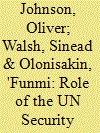| Srl | Item |
| 1 |
ID:
183921


|
|
|
|
|
| Summary/Abstract |
Ebola Virus Disease struck Sierra Leone in May 2014. An international response was instrumental in ending the epidemic by December 2015 and has been extensively documented. Less attention has been paid to local responses. Here, we focus on a case in which there was no infection despite high infection in neighbouring areas. This brings into focus the role of customary public authority in implementing successful controls. We pay particular attention to the activities of a chiefdom Ebola Task force committee chaired by the Paramount Chief. Meetings were characterised by protocol and ceremony, but ‘face time’ served to reinforce, in ritual terms, important messages about quarantine and social distancing. The committee's pronouncements had illocutionary force. Local volunteers translated this ceremonial message into practical action to block imported cases. The analysis of ceremonial competence, we conclude, opens a window into how public authority addresses developmental shocks in Africa.
|
|
|
|
|
|
|
|
|
|
|
|
|
|
|
|
| 2 |
ID:
187524


|
|
|
|
|
| Summary/Abstract |
The UN Security Council has increasingly involved itself in health emergencies over the last two decades, but the advantages and potential risk of its role have not been well explored. The experience Security Council intervention in the Ebola outbreak in Sierra Leone can be instructive, in particular because it contributed to the establishment of a first-ever UN emergency health mission. While this mission was not considered effective, Security Council involvement may have helped to mobilise resources, highlight the need for a cross-sectoral response, and maintain international flights. More broadly, however, questions remain about whether the securitisation of health risks diverting funding and policy focus towards the priorities of wealthy countries and away from basic health needs.
|
|
|
|
|
|
|
|
|
|
|
|
|
|
|
|